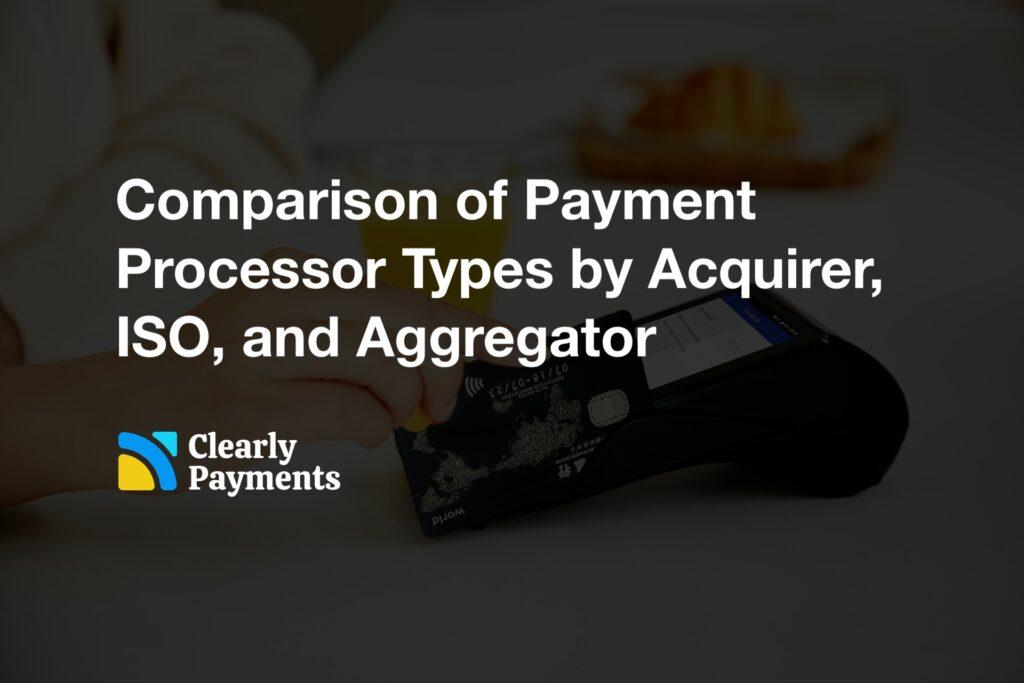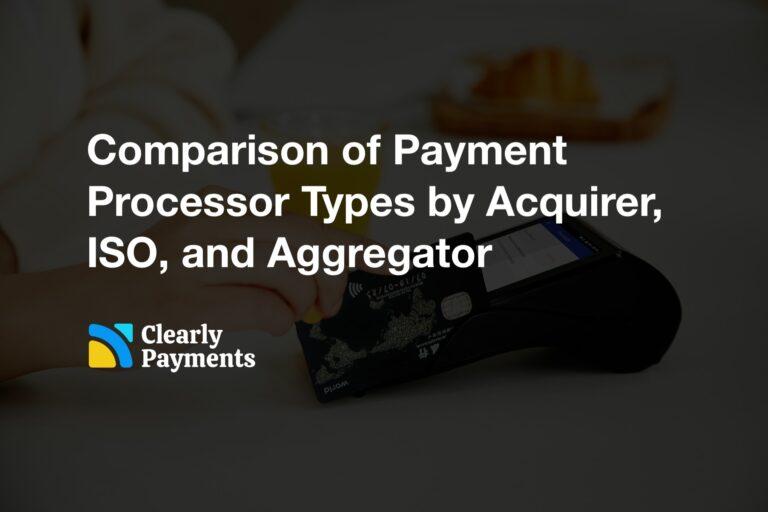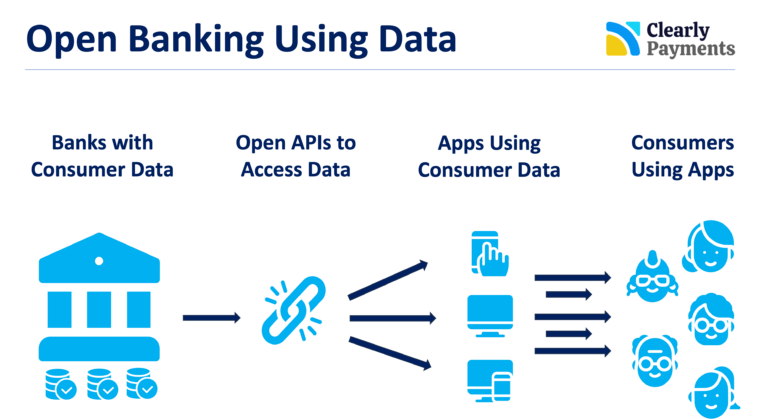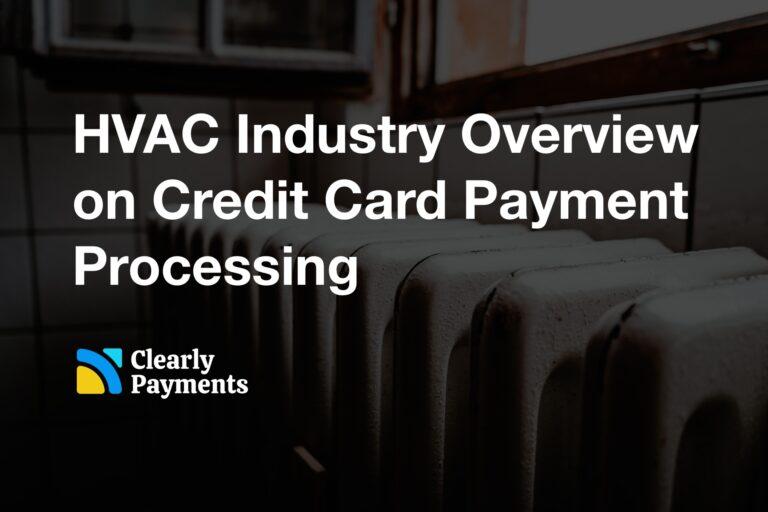In the intricate landscape of payment processing, merchants are confronted with a choice between three types of payment processors: Acquirers, Independent Sales Organizations (ISOs or MSPs), and Aggregators (PSPs or PayFacs). Understanding the distinctive roles each plays is important for businesses seeking an optimal payment processing solution.
This article covers the differences between Acquirers, ISOs, and Aggregators, shedding light on their unique functions and contributions to the flow of debit card and credit card transactions. Additionally, we provide a list of notable Acquirers, ISOs, and Aggregators, offering a reference point for merchants exploring potential partners in the payment processing space.
As we navigate these details, we’ll guide you through the considerations essential for choosing the right type of payment processor for your business, ensuring a decision aligned with your operational needs, risk tolerance, and growth aspirations.
Difference of Acquirers, ISOs, and Aggregators
Acquirers, ISOs, and aggregators each play vital roles within the payment processing ecosystem, and a nuanced understanding of their distinctive functions is crucial. They are all considered payment processors, but there are differences.
In essence, while acquirers focus on the direct connection between merchants and payment networks, ISOs act as intermediaries, and aggregators streamline the process by offering a consolidated approach to managing diverse payment processing options. Each entity plays a unique and indispensable role in payment processing.
Acquirers or Acquiring Banks
Acquirers or Acquiring Banks are financial institutions that establish a direct link between merchants and major payment networks such as Visa, Mastercard, and American Express.
Acquirers are the largest institutions that you can get a merchant account. Most aggregators and ISOs build on top of acquirers and add the value with better software and better customer service.
Acquirers assume the responsibility of authorizing and processing credit and debit card transactions on behalf of merchants. Additionally, they manage the intricate processes of fund settlement while delivering comprehensive reporting and reconciliation services.
ISOs (Independent Sales Organization) or MSP (Merchant Service Provider)
ISOs (Independent Sales Organizations) are entities that collaborate with acquirers to get customers/merchants and oversee merchant accounts. Serving as intermediaries, ISOs facilitate the establishment and management of payment processing systems for merchants. Beyond this, they offer valuable marketing and sales support to enhance the merchant’s overall experience. Many ISOs build and sell cutting edge software to make payments more efficient and easier.
An ISO is what Visa calls their approved merchant account providers and an MSP is what MasterCard calls them. Both ISOs and MSPs go through a process to get approved by Visa and MasterCard. Most providers apply to both, so you’ll often see on their website something like “Approved ISO/MSP of” some acquirer. In the end, and ISO and MSP are the same thing.
Some ISOs have the contractual relationship with merchants and take on the payment processing risk. However, some ISOs simply resell the services of acquirers and therefore the contractual agreement that the ISO sells is between the acquirer and the merchant. ISOs come in all shapes and sizes and are the most popular way that merchants get merchant accounts. There are 3500 ISOs across North America.
Aggregators or PayFacs or PSPs
Aggregators, also known as Payment Service Providers (PSPs) or Payment Facilitators (PayFacs), are entities that establish partnerships with multiple acquirers and ISOs, offering merchants a diverse array of payment processing options. These entities serve as a central point of contact, streamlining the merchant experience by managing relationships with acquirers and ISOs while providing supplementary services like fraud prevention and reporting. Utilizing their dedicated software platforms, aggregators integrate the services of various acquirers and ISOs, enhancing efficiency in the complex landscape of financial transactions.
One crucial distinction lies in the functional difference between an ISO/MSP and a PSP/PayFac: with an ISO/MSP, merchants have their own dedicated merchant account, whereas with a PSP/PayFac, they do not. This distinction has practical implications, influencing factors such as ease of integration and control over the payment process. While the terms may be used interchangeably, understanding these nuances is essential for businesses seeking the most suitable payment processing solution for their needs.
List of Acquirers, ISOs, and Aggregators
Below is a list of either the largest, very reputable, or popular payment processors in the world broken up by acquirer, ISO, or aggregator.
List of Acquirers or BIN Providers
List of ISOs /
MSPs
List of Aggregators / PayFacs / PSPs
- 2Checkout
- Adyen
- Amazon Pay
- Authorize.Net
- AliPay
- Braintree
- Helcim
- Intuit Payments
- iZettle
- Optimal Payments
- PayPal
- Payoneer
- Square
- Stripe
Choosing the Right Type of Payment Processor
Navigating the realm of payment processing presents merchants with three primary options: Acquirers, Independent Sales Organizations (ISOs), and Aggregators.
Each entity plays a distinct role in facilitating financial transactions, and understanding their differences is crucial for merchants seeking the most suitable payment processing solution.
Main Considerations in Choosing the Type of Processor
1. Transaction Volume:
- Aggregators: Suitable for annual transaction volumes below $500,000 per year.
- ISOs and Acquirers: Preferred for businesses processing higher transaction amounts.
2. Integration and Control:
- Aggregators: Offer ease of integration but limited control over the payment process.
- ISOs and Acquirers: Provide dedicated merchant accounts, offering more control to merchants.
3. Approval Speed and Process:
- Aggregators: Expedited approval with minimal paperwork. You can simply sign up online like getting a PayPal account.
- ISOs and Acquirers: May involve a more detailed approval and underwriting process.
4. Risk Considerations:
- Aggregators: Quick to freeze funds or close accounts in the case of perceived risks due to shared merchant accounts.
- ISOs and Acquirers: Provide dedicated accounts, potentially reducing collective risk.
5. Cost Considerations:
- Aggregators: Can be more expensive but offer convenience and speedy approval.
- ISOs and Acquirers: May involve a more cost-effective approach for businesses processing higher volumes. There is also more room to negotiate fees.
The choice between the different options of payment processors depend on practical considerations such as transaction volume, integration preferences, approval speed, risk tolerance, and cost considerations. Payment Service Providers (PSPs) are generally suitable for businesses with annual transaction volumes below $500,000, providing expedited approval and ease of integration.
Conversely, ISOs offer more control over the payment process with dedicated merchant accounts, making them preferable for businesses processing higher transaction amounts. Additionally, PSPs may be quicker to freeze funds or close accounts in the case of perceived risks due to shared merchant accounts, while ISOs provide dedicated accounts, potentially reducing collective risk.
Cost considerations play a role, with PSPs potentially being more expensive for larger merchants but offering convenience and speedy approval, whereas ISOs may provide a more cost-effective approach for businesses processing higher volumes. Careful consideration of these factors ensures merchants select a payment processing solution aligned with their specific needs, risk tolerance, and operational preferences.
In summary, the general guideline is to lean towards a Aggregators if your annual transaction volume is below a $500,000. If you are above that, you should look at ISOs or Acquirers. The decision ultimately hinges on your business requirements and the level of service you seek in payment processing.




